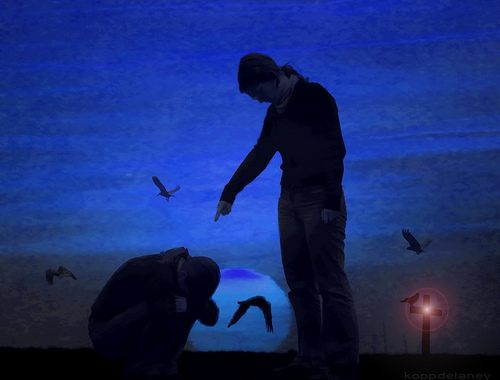We run our website the way we wished the whole internet worked: we provide high quality original content with no ads. We are funded solely by your direct support. Please consider supporting this project.
Becoming Like the Accuser
When the Adam and Eve yielded to Satan and surrendered their God-given authority over the earth and animal kingdom (Gen 3), Satan became “the god of this world” (2 Cor. 4:4), the “ruler of the world” (Jn. 12:32; 14:31) and the “principality and power of the air” (Eph. 2:2) who “has power over the whole world” (1 Jn. 5:19).
Satan is first and foremost a judger. Throughout the Bible we find him bringing judgments against God and humans (The book of Job makes this most clear.) For good reason the Bible labels him “the Accuser” (Rev. 12:10). Not surprisingly, when Adam and Eve opened up their lives to this, they first accepted Satan’s accusation that God is a petty deity who is threatened by their access to the forbidden tree. Once they act on this false picture of God by violating the prohibition, they then judge God to be unmerciful as they hide from him in fear (Gen. 3:8).
When questioned by God, Adam blamed God as well as Eve for his misdeed. “The woman you put here with me – she gave me some fruit from the tree, and I ate it” (Gen. 3:12, emphasis added). Eve in turn also refused to own up to her sin and instead placed all the blame on the serpent (Gen. 3:12).
Though the couple was created to bear God’s image, the Accuser succeeded in getting them to take on something of his image, reflecting his ugly, accusatory character. The couple and all their descendants had become a rebel race of accusers, co-opted into the rebellion of the Powers against the Creator.
Instead of receiving and reflecting God’s life and love toward on another, we now tend to view others through the eyes of our hungry soul and our assumed “knowledge of good and evil.” In our rebellious condition, we tend to “love” those who contribute in some way to our idolatrous sense of fullness of Life—the “good” people—and we tend to despise those we judge to be detracting from our idolatrous sense of fullness of Life—the “bad” people. We judge some as worth loving and others worth hating when we’re under the influence of the Accuser and our stolen “knowledge of good and evil.”
As a result, the human community has become fragmented and filled with violence. The history of humanity has largely been a history of horrific brutality.
Our inability to refrain from violence, despite our remarkable intelligence in some areas and despite our best intentions to avoid it, is arguably the single greatest sign of our subjection to the one whom Jesus says “was a murderer from the beginning” (Jn. 8:44). When people are subjected to the Accuser and filled with judgments, violence is never far away.
The biblical record bears witness to our violent tendencies as a race of accusers. No sooner had the first couple been expelled from the Garden than their first child murdered their second, judging that Abel was in competition with him for God’s approval (Gen 4). As violence always does, this first act of violence set off a chain reaction of violence, to the point that Lamech, a descendent of Cain, boasted that his thirst for vengeance was ten times great than what God had threatened (vs. 24)!
Violence under the reign of the Accuser continued to escalate to the point that, within a couple millennia the world had become so “full of violence” the Lord had to stoop still further and start the whole creation project over again by sending a flood (Gen 6). Had he not done this, all indications are that God’s plan for the human race would have been hopelessly derailed. It was God’s only hope of rescuing the human race from irreversible destruction.
Yet, as drastic as it was, this measure did not put an end to the reign of the destructive Powers. Nor did it reform our fallen accusatory nature. Consequently, sin and violence began to encroach back into the world soon after the flood. Indeed, the rest of the biblical narrative and the whole of human history is one, long, tragic testimony to the truth that, so long as we’re separated from God, we can’t help but separate ourselves from one another. Until we are free from our bondage to the Accuser, we simply can’t stop accusing, which invariably results in some people judging that their enemies don’t deserve to live.
Category: General
Tags: Judgment, Tree of the Knowledge of Good and Evil, Violence
Topics: Following Jesus
Related Reading

Podcast: How Do We Respond to Sexual Violence?
Greg discusses a Christ-like response to sexual abuse. Do we “turn the other cheek” in the face of sexual abuse? http://traffic.libsyn.com/askgregboyd/Episode_0077.mp3

Will Violence against ISIS Root Out Evil?
Image by arbyreed via Flickr Fallen humans tend to identify their own group as righteous and any group that opposes them as evil. If they were not evil, we tend to believe, no conflict would exist. Hence, the only way to end the conflict is to rid the world of this evil. This is the age-old “myth…

Love Conquers All
Paul prayed in this way for the church at Ephesus: I pray that, according to the riches of his glory, [God] may grant that you may be strengthened in your inner being with power through his Spirit, and that Christ may dwell in your hearts through faith, as you are being rooted and grounded in…

The Kind of Sin Jesus Publicly Exposes
Image by danny.hammontree via Flickr Religious sin is the only sin Jesus publicly confronted. The religious variety of the forbidden fruit is the most addictive and deceptive variety. Instead of acknowledging that judging others is prohibited, religious idolatry embraces the knowledge of good and evil as divinely sanctioned and mandated. It gives the illusion of being on…

Should We Condemn Unbelievers For Their Own Good?
We are to have faith that what God says about himself in Christ is true, what God says about us in Christ is true, and what God says about others in Christ is true. So whatever the appearances may be, we are to have faith that God is working in others to do what…

Did Yahweh Crush His Son?
Though Isaiah was probably referring to the nation of Israel as Yahweh’s “suffering servant” when these words were penned, the NT authors as well as other early church fathers interpreted this servant to be a prophetic reference to Christ. Speaking proleptically, Isaiah declares that this suffering servant was “punished” and “stricken by God” (Isa 53:4,…

